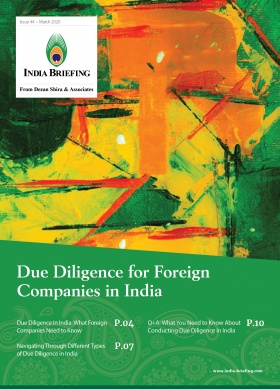India’s Consolidated FDI Policy, 2020: Key Aspects
India announced its latest consolidated foreign direct investment (FDI) policy this week, which is in effect from October 15, 2020 (as per the official circular released by the government).
The Consolidated FDI Policy, 2020 incorporates restrictions notified earlier in the year on FDI coming in from overseas entities or citizens belonging to neighboring countries that share a land border with India, including China, to prevent opportunistic takeovers of firms whose operations and finances may have suffered during the lockdowns and due to the general impact of the COVID-19 pandemic.
Other updates to the 2020 FDI policy have consolidated the changes introduced to India’s FDI regulation since the previous policy was implemented (August 28, 2017). These include respective press notes issued by the Department for Promotion of Industry and Internal Trade (DPIIT) and RBI regulations over the last three years.
The new iteration of the FDI policy was announced as India witnessed a 16 percent year-on-year rise in FDI to US$27.1 billion during April-August this year. In the same period, last year, India had received FDI worth US$23.35 billion. Further, the total FDI inclusive of reinvested earnings for the first five months of this financial year was US$35.73 billion; this figure was US$31.60 billion during the same period in the preceding financial year. The total FDI inflow to India grew by 55 percent from US$231.37 billion in 2008-14 to US$358.29 billion in 2014-20.
Below we highlight key aspects of India’s 2020 Consolidated FDI Policy.
Government scrutiny of investments from India’s neighboring countries
Foreign investments from these neighboring countries and beneficiaries of such investment in India who are situated in or are citizens of any such country – are to be vetted by the government irrespective of the scope of the investment. In fact, according to a government official, given that there is no mention of a minimum or a maximum threshold limit – even if the foreign investment from such country is a fraction or small amount, it will trigger government scrutiny.
The circular states:
- An entity of a country, which shares a land border with India or where the beneficial owner of an investment into India is situated in or is a citizen of any such country – can invest only under the Government approval route. Further, a citizen of Pakistan or an entity incorporated in Pakistan can invest, only under the Government route. No such investment is allowed from Pakistan in defense, space, atomic energy and sectors/activities that are prohibited for foreign investment.
- In the event of the transfer of ownership of any existing or future FDI in an entity in India, directly or indirectly, results in the beneficial ownership falling within the restriction/purview of the above – this will also require Government approval.
Investment cap on digital news media
A 26 percent cap on equity / FDI has been introduced in the segment that covers digital news (uploading or streaming of news and current affairs through digital media), which also requires government approval. This brings it at par with the investment cap on newspaper and periodical publications and the publication of Indian editions of foreign magazines dealing with news and current affairs, which are also subject to the government approval route. Detailed guidelines on foreign direct investment into the broadcasting sector are provided in Annexure-6 of the circular. (The official document may be accessed here.)
Compliance obligations for e-commerce entities
The latest FDI policy states that it is mandatory for e-commerce entities with foreign investment to obtain and maintain a statutory audit report by September 30 every year for the preceding financial year, which indicates their compliance with India’s laws. This compliance requirement was first introduced in 2019.
The 2020 FDI policy circular also details the recent changes in regulating foreign investment in e-commerce in India, which includes the following:
- Prohibiting an entity related by equity to the e-commerce platform from doing business on the website portal;
- Restricting vendors from buying more than 25 percent of their inventory from the platform and its group companies; and
- Banning exclusive product launches.
These norms regulating e-commerce entities were implemented from 2018.
100 percent FDI under automatic route is permitted in the marketplace model of e-commerce in India. The marketplace-based model means the e-commerce entity essentially provides an information technology platform on a digital and electronic network – to act as a facilitator between buyer and seller.
Thus, e-commerce entities in India that receive FDI can only engage in business to business (B2B) e-commerce and not in business to consumer (B2C) e-commerce.
Entry routes for investment into India and the approving authorities for the government route
Investments can be made by non-residents in the equity shares/fully, compulsorily and mandatorily convertible debentures/fully, compulsorily and mandatorily convertible preference shares of an Indian company, through the automatic route or the government route.
- Under the automatic route, the non-resident investor or the Indian company does not require any approval from government of India for the investment.
- Under the government route, prior approval of the government of India is required. Proposals for foreign investment under government route, are considered by the respective administrative ministry/department.
In the table below, we present the respective competent authorities for granting approval for FDI into those activities/sectors scrutinized by the government.
 For more information and advice for foreign investors on doing business in India, please feel free to email us at india@dezshira.com.
For more information and advice for foreign investors on doing business in India, please feel free to email us at india@dezshira.com.
About Us
India Briefing is produced by Dezan Shira & Associates. The firm assists foreign investors throughout Asia from offices across the world, including in Delhi and Mumbai. Readers may write to india@dezshira.com for business support in India.
- Previous Article How Will India’s Revised FDI Policy Impact Future Chinese Investment?
- Next Article Why US Businesses Should Consider Investing in India







